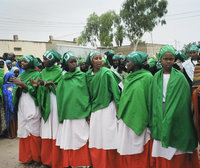America's top African diplomat recently signaled Washington's desire to establish more official contacts with the autonomous region of Somaliland, which sits within the internationally recognized borders of the failed state known as Somalia. Meanwhile, both our Agency for International Development and the Pentagon's recently established Africa Command worry about Sudan's upcoming vote on formally splitting the country in two. For a country that has sworn off nation-building, it's interesting to see just how hard it is for America to remain on the sidelines while globalization remaps so much of the developing world.
Not that globalization causes changes that otherwise would not occur. It's just that globalization, and the connecting opportunities it offers, tends to empower groups within weak or artificial states to plot their escape routes. That's why the number of states around the world will continue to grow in response to globalization's advance, whether the U.S. gets involved or not.
Weak states are pretty easy to spot, since they cannot control their territory. But what's an "artificial state"? It depends on the degree to which that nation's borders were drawn, rather than discovered.

